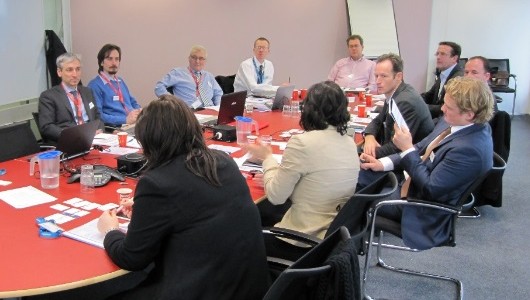About DEMCOPEM-2MW
What:
The acronym DEMCOPEM-2MW is derived from the words DEMonstration, COmbined heat and power (or Cogeneration), PEM fuel cells and 2 Mega Watt electrical power (MWe). It is a Fuel Cells and Hydrogen Joint Undertaking (FCH JU) co-funded project which focus is to explicitly demonstrate the feasibility, reliability, and availability of PEM fuel cells in a large scale stationary application of at least 2 MWe in China. The demonstration will take place in the industrial environment of a chemical factory.
Who:
The DEMCOPEM-2MW consortium consists of 5 partners from 3 different EU countries: AkzoNobel Industrial Chemicals (Coordinator, NL), MTSA Technopower (NL), Nedstack PEM Fuel Cells (NL), Johnson Matthey Fuel Cells (UK) and Politecnico di Milano (IT). The work performed so far already developed a modelling activity for the system (Polimi) and produced stacks (MEAs from JM and Stacks from NFCT) to be integrated in a stationary container (specially designed for the project by MTSA) which will be shipped to China. AkzoNobel, together with the coordination of the project is also responsible for the main exploitation plan (in Europe and China).
Why:
The most important advantages of the technology developed in the project are summarized below:
- It is clean, silent, and non-polluting. The exhaust product, pure water, could also be utilized in the process.
- In the chlorine industry hydrogen of high quality is often available at low or zero cost, and the heat and electrical power from hydrogen can be directly fed into the plant’s production process. PEM fuel cell power and heat will be delivered at the industrial level of 2 MW electrical power (MWe) and 1.5 MW of heat.
- The hydrogen contains almost 45% of the energy that is consumed in the plant. In many cases this hydrogen is vented. The project will demonstrate the PEM Power Plant technology for converting the hydrogen into electricity, heat and water for use in the chlor-alkali production process, lowering its electricity consumption by 20%.
- A successful demonstration will pave the way for the roll out of the technology, staged cost efficiencies and further self-sustained market and technology developments.
 When:
When:
The project officially started on 1st Jan 2015 and will end on 31st December 2018, for a total duration of 48 months. The kick off meeting took place in Amsterdam (at AkzoNobel) on 20th – 21st January 2015. The Fuel Cells and Hydrogen Joint Undertaking (FCH JU) was represented by Mirela Atanasiu (project manager and contact person for the project by the FCH JU); on the left a photo from the meeting.
Since then different teleconferences, technical meetings and three more General Assemblies took place (at Polimi and MTSA), the next consortium meeting is planned in May 2016.
Where:
For the demonstration of the DEMCOPEM’s technology, a site in China near a new chlor-alkali plant has been selected. The commercial viability of PEM fuel cells in competition with thermal machines is best demonstrated in the chlor-alkali industry in China because in this industry the value of the PEM fuel cell electrochemical power is the highest. This is due to the relatively high electricity prices in most areas in China. These are up to 2 times higher than in Europe and rising. Also, the common shortage of electricity supply in China in certain periods of the year contributes positively to the business case via the contribution margin of additional chlorine production in these periods.
How:
The main objective of the four years DEMCOPEM-2MW project is to design, build and operate a 2 MW power generator, with -among others- the following attributes:
- Full integration of heat and power with an existing chlorine production plant
- Fully automated way of operation and remote control
- Economical design to reach a competitive price, i.e. < €2,500 / kWe with potential for reaching < € 1,500/kWe in 2020. With membrane lifetime of 5 years and high volume series (> 25 MWe/y) production the cost price of the electricity produced with a PEM power plant is estimated to drop from 0,075 to below 0,04 Euro/kWh.
- Demonstration of power and heat generation for over 2 years i.e. on-stream availability of > 95% for over 16,000 hours, in line with the Annual Implementation Plan 2013 objectives.
The full list of project objectives can be found here.


